- Home
- V. S. Naipaul
Guerrillas Page 2
Guerrillas Read online
Page 2
That was how the communiqué began. But Jane, reading on, found that it soon became what Roche had said: a fairy story, a school composition, ungrammatical and confused, about life in the forest, about the anxieties, dangers, and needs of isolated men, about the absence of water, electricity, and transportation. And then it was full of complaints, about people and firms who had made promises they hadn’t then kept, about gift equipment that had turned out to be defective.
Jane, looking up from the duplicated sheets, caught the eyes of one of the boys. On the wall above his bed she saw a poster: a pen drawing of Jimmy Ahmed that made him all hair, eyes and mustache, and more Negroid than he was, with roughly lettered words below: I’m Nobody’s Slave or Stallion, I’m a Warrior and Torch Bearer—Haji James Ahmed.
The oblong windows showed a colorless sky. But Jane had a sense now of more than heat; she had a sense of desolation. Later, on the Ridge, in London, this visit to Thrushcross Grange might be a story. But now, in that hut, with the junked office equipment on the table, the posters and black pinups from newspapers on the walls, with the boys on the metal beds, with the light and the emptiness outside and the encircling forest, she felt she had entered another, complete world.
She heard a hiss. It was one of the street noises she had grown to recognize on the island. It was how a man called to someone far away: this hiss could penetrate the sound of traffic on a busy road. The hiss came from a boy on one of the beds. She knew it was meant for her, but she paid no attention and tried to go on reading.
“Sister.”
She didn’t look up.
“White lady.”
She looked up. She took a step toward the beds. Then, made bold by this movement, she walked between the beds, looking for the boy who had spoken.
Only Mannie was sitting up; all the other boys were lying down. One boy seemed to stare through her as she passed his bed. But then she heard him say softly, as though he was speaking to himself, “So you know your name.” And the boy on the next bed said more loudly, and in an abrupt tone, not looking at her, his shining face resting on one side on his thin pillow, his close-set bloodshot eyes fixed on the back doorway: “Give me a dollar.”
His face was oddly narrow, and twisted on one side, as though he had been damaged at birth. The eye on the twisted side was half-closed; the bumps on his forehead and his cheekbones were prominent and shining. His hair was done in little pigtails: a Medusa’s head.
She took out a purse from her shoulder bag and offered a red dollar note, folded in four. Raising his arm, but not changing his position on the bed, still not looking at her, he took the note, let his hand fall on the bed, and said, “Thank you, white lady.” And then there was nothing more to do or say. She walked back past the beds, feeling the silence behind her, and went out into the sunlight, stepping from the concrete floor of the hut onto red, hot clay.
She considered the forest palms, their straight trunks hazy with black needles, their living, rotting hearts bandaged, it seemed, with tattered sacking. The land was shaved and bare and bright all the way down to the road and up to the forest wall. But the land at the back of the long hut already seemed derelict and half abandoned. She saw empty chicken-coops, roughly knocked together with old boards and with sagging walls of soft wire netting, like the chicken-coops in the open yards of the redevelopment project in the city, so that already, in the midst of bush, the effect was of urban slum. She saw piles of old scantlings and corrugated-iron sheets, rolls of old wire, drums: back yard junk. She saw a pit of some sort: dried-up mounds of clay, a heap of concrete blocks. At the edge of the clearing there was a corrugated-iron latrine on a high concrete base. It was silver in the hard light, and the door was open. A thatched roof had been fixed to the back wall of the concrete hut, at the far end. It began halfway up the wall and sloped down almost to the ground. In the black shade of the thatch, on a wash stand made of trimmed branches, there were unwashed enamel bowls and plates and basins; the ground below was dark and scummy. Desolation: she had the urge now to get away.
When she saw Roche and Jimmy Ahmed coming to where she was, she could tell, from the melancholy and irritation in Roche’s face, that he had been quarreling with Jimmy. But Jimmy was as expressionless as before, his mouth as seemingly clamped shut below his mustache.
Roche said, “You’re going to have an epidemic on your hands one of these days.”
Jimmy said, “Yes, massa.”
Roche smiled at Jane. His irritation was like her own; but his smile depressed her. That smile of his, which had once seemed so full of melancholy and irony, issuing out of the largest vision of the world, now seemed to hold only a fixed, meaningless irony. And less than that: it held sarcasm, frustration, pettishness.
They walked to the car to drive to the field. Jane sat with Roche; Jimmy sat in the back. Too soon for Jane, who would have preferred to consider the visit over, they got out, to the renewed shock of heat and glare, and crossed from the road to the path at the edge of the leveled field, beside the wall of forest. They walked one behind the other: Roche, Jane, Jimmy. Roche was still irritable. Jimmy’s impassivity had turned to something like calm. To Jane he was even considerate: she was immediately aware of that.
He said, in his light voice, “How did you get on with the boys?”
“We didn’t say very much.”
Roche said without turning round, “They don’t have too much to talk about.”
Jimmy gave his grunt. “Hmm.”
The sun was full on them and full on the forest wall, less green, drier, and more pierced than it appeared from a distance. There was no play of air. The path was hard and bumpy and they kicked up dust as they walked. Jane was sweating; dust stuck to her skin.
Roche said, “Did they ask you for money?”
“One of them asked me for a dollar.”
Jimmy said, “That was Bryant.”
“A boy with pigtails. Very black.”
“Bryant,” Jimmy said.
Roche said, “Did you give him a dollar?”
“No.”
Jimmy said, “Hmm.”
They walked between the forest and the dry field, past the furrows where shiny green weeds grew out of the caked earth; past the abandoned red tractor marked Sablich’s; past the crumbling thatched shed where long-stalked tomato seedlings yellowed in shallow boxes of dried earth; past human excrement laid in two places on the path itself. They went silent after stepping over the excrement.
Then Jane said, thinking of shade, and thinking at the same time of something that Jimmy and his boys might find easier to do, “Are you planting any fruit trees?”
Jimmy said, “That’s long-term. In this phase of the project we need cash and we are concentrating on cash crops.”
They came to the end of the field, where four boys in jeans and rubber boots stood in weed-choked furrows and straddled four dry ridges. As if in parody of nineteenth-century plantation prints, which local people had begun to collect, the boys, with sullen downcast eyes, as though performing an unpleasant duty, were planting tomato seedlings which, as fast as they were set in their dusty little holes, quailed and drooped.
Jimmy said to Jane, as though speaking of a purely local vegetable, “Tomatoes. You can pay eighty cents a pound in the market. Marketing, massa—that’s going to be a problem.”
Roche said, “We’ll cross that particular bridge when we come to it.”
They left the boys behind and walked to where clumps of bamboo grew at the edge of the forest and arched over the field. It was cool in the shade of the bamboo, and the ground was soft and padded with dead bamboo leaves. The bamboo stalks, of all the colors from bright green to chrome yellow to straw, swayed under their own weight and rubbed creaking against one another. One clump had ignited; but green shoots were already sprouting from its blackened, ashy heart.
In that part of the field shaded by the bamboo, weeds had grown almost to bush. Through this they walked to what Jimmy said was the vegetable garden; th
e vegetables grown there were intended only for Thrushcross Grange. The vegetable garden was knee-deep in weeds, with no sign of furrow or ridge. Neither Jimmy nor Roche appeared surprised. Jimmy, suddenly energetic, pulled back weeds, looking for what had been planted, and showing what had grown: deformed, pale eggplants, stunted okras. He was excited; he was like a man discovering the simplicity of nature, its unchanging laws, the processes that worked for him as they did for others.
JIMMY DIDN’T live at Thrushcross Grange. His house was a little distance away, separated by a block of forest from the commune hut. There was a path through the forest, but there was also a way through the side roads of the former industrial park, and they went in the car.
The invitation was unexpected; Roche had always found Jimmy secretive about his house. But Jane was not surprised. She had already begun to feel that Jimmy’s initial coldness had only been a form of anxiety; that he had considered the visit important and had prepared for it, had prepared his entrance, his set blank face; and that gradually he had unwound, had become more and more a man anxious to make an impression, to display himself. There had come a moment in the vegetable garden when, as Jimmy had bent down to separate weeds from vegetable plants, Jane had thought: He is a candidate. And her irritability, which until then had been the irritability of heat and disgust, had altered, had become the irritability of the woman who knew she was being courted. She had become more at ease.
Even before they had got as far as the striped sentry box, Roche, shut in behind this dark glasses, had recognized her new mood. It was something he had remembered from their early days in London: that irritability, mixed with an abrupt coyness, which was her special style. The sea anemone, he thought, waving its strands at the bottom of the ocean. Rooted and secure, and indifferent to what it attracted. The dragon lady, infinitely casual, infinitely unconsciously calculating, so indifferent to the body, so apparently willing to abuse it, and yet so careful of the body, so careful of complexion and teeth and hair.
The house stood by itself at the end of a narrow road that stopped some distance away from the forest wall. During the days of the industrial park it had been the house of an American factory manager. The enterprise had, within its period of grace, withdrawn its capital and its machinery; the factory buildings, shells of corrugated iron or timber, had been auctioned off as building materials and dismantled; and all that remained now of the factory was the dead-end road, the flatness on either side of the road, and the house at the end of the road.
Pink and white oleanders had grown tall around the house, and bougainvillaea had run wild: sudden bright color in the brownness. The house, which stood on low concrete pillars and had ocher-washed concrete walls, looked simple in plan; but the corrugated-iron roof was complicated: an attempt at what was known locally as the California style.
As they arrived, a small blue van came out of the yard: CHEN BROS The Quality Grocery. Roche pulled aside to let the van pass, and then drove in, past the white glare of the front porch, to the shelter and cool of the car port at the side of the house. On the concrete steps at the far end were cardboard boxes, full of parcels and packages.
Jane said, “They deliver here?”
“And they deliver free,” Roche said, taking off his dark glasses. “It’s the next best thing to living off the land.”
“My Chinese brothers,” Jimmy said. As they walked back into the sunlight, to the front of the house, he addressed Jane directly: “Do you know about the Chinese?”
She was coy, interested, amused.
“I was born in the back room of a Chinese grocery. But that must be pretty obvious.”
Jane said, “I don’t know anything about Chinese groceries.”
“I suppose that’s why I’ve always felt hungry. My Chinese brothers understand the situation.”
The garden looked at once scorched and overgrown. Crab grass had grown long, with more stalk than grass, and had dried, leaving bare patches of earth. But the drought that had killed the land and set the hills on fire had drawn out the tenderest blooms from the unpruned bougainvillaea and the almost stripped hibiscus shrubs. It was the season of new leaves; where these had appeared they were still of the freshest green.
Sunlight struck full on the terrazzo porch, and the living room caught the glare. A square of English carpet, electric blue with splashes of black and yellow, almost covered the floor. The furniture was also English and had a similar innocent stylishness; it was of a kind seen in the windows of furniture shops on the main streets of English market towns. A three-piece suite, square and chunky, with fat cushions, was covered in a tiger-striped synthetic material, thick and furry. On the fitted bookshelves a number of books in the same magenta binding stood solidly together: The Hundred Best Books of the World; there were also some paperbacks and a neat stack of records. A blue-tinted glass vase held three sprays of bougainvillaea. It was a room without disorder; it had obviously been prepared for this visit.
Jane felt that some comment was expected of her. She said, “But it’s like being in England.”
Jimmy said, “All the stuff here comes from England. You know what they say. You may not be able to make a living in England, but England teaches you how to live.”
On two of the fitted shelves, below the books and the records, there were unmounted photographs in cheap stand-up frames: Jimmy in London, with various people. Jane recognized some celebrities: an actor, a politician, a television producer. They were people outside Jane’s circle, and in London she had been indifferent to their names. But they seemed glamorous here; and the perception came to her that in this setting, which was his own, Jimmy was a diminished man.
She said, “Your English mementos.”
He picked up the automatic irony in her voice, and his eyes went restless. Then his mouth was clamped shut below his mustache.
She saw another photograph in a frame. The photograph had been mutilated, irregularly cut down the middle, to exclude someone. What remained showed two children of mixed race, with plump faces and thick features, hair kinkier than Jimmy’s, and skins that were not pale. A mutilated photograph, a reminder of the person cut out: it was odd that a man so fond of photographs didn’t have portraits of the children alone.
A triangle of white light was advancing from the porch into the sitting room, over the curling edge of the electric-blue carpet, which lay untacked on the terrazzo floor. Glare picked out fine dust on the smoked glass top of the oval center table. On this table Jane saw, as though laid out for inspection, airmail letters with English stamps.
She said, “You must miss England?”
She saw him hesitate: it was as though she had asked him a trap question.
Roche said, with that weary tone that had once set her looking for deeper meanings in his words, “England is in the eye of the storm. It’s part of their great luck.”
Turning half-coy from Jimmy, her complexion so fresh, so well cared for, she said, irritation coming quickly to her eyes, “Is it lucky to be half dead?”
It was what he had taught her, what she had picked up from him and incorporated, as words, as a passing attitude, into the chaos of words and attitudes she possessed: words that she might shed at any time, as easily as she had picked them up, and forget she had ever spoken them, she who had once been married to a young politician and had without effort incarnated an ordinary correctness, and who might easily return to such a role. She was without memory: Roche had decided that some time ago. She was without consistency or even coherence. She knew only what she was and what she had been born to; to this knowledge she was tethered; it was her stability, enabling her to adventure in security. Adventuring, she was indifferent, perhaps blind, to the contradiction between what she said and what she was so secure of being; and this indifference or blindness, this absence of the sense of the absurd, was part of her unassailability.
Jimmy said at last: “I miss my children.”
He offered soft drinks. He was a Muslim, he said, and drank no
alcohol. After he had served them he sat down in one of the furry chairs. With two small, deft movements he hitched up his trousers, holding each crease between a thumb and forefinger. He rested his bare arms flat on the arms of the chair, and began very gently to rub his palms over the thick synthetic fur. Jane noted the rubbing gesture and stroked the fur on her own chair. It was smooth and felt almost oiled; her palms tickled and her teeth were set on edge. He was so neat, with his tight, creased trousers; his gestures were so small and precise. His full lower lip was moist and very pink in the middle, it seemed to Jane it had been worn down to this color by the constant little licks he gave with the tip of his tongue. He shaved very close; the stiff hair was embedded deep in his coarse skin, and his cheeks and chin were bumpy from the razor, with a whitish bloom on the bumps.
The soft drink he had offered was disagreeable. It had the tainted-water taste of the pale fluid at the top of an unshaken bottle of orange juice; and the frosted tumblers, more or less full, running with wet on the outside, remained on their wooden coasters on the glass-topped table.
Roche had withdrawn from the conversation. His brow had puckered; his irritation showed. Jane was calm.
Jimmy said, “England isn’t real.”
“What do you mean, it isn’t real?” Roche said. “Do you know what you mean?”
Jane said, “I know what he means.”
Jimmy gave a little lick to his lips. His hands went still, fingers spread on the arms of his chair, and he held his back flat against the back of his chair. “The problems aren’t going to be solved there. You know what happens in England. Everybody goes to the demo and the meeting and then they leave you and go home to tea.”
Roche said, “Do they still go home to tea in England?”
Jimmy looked at Jane. She was interested, smiling, coy, very pink. He said, “I got away in time. I was lucky. Over there the black man can become”—he fumbled for the word—“like a playboy. They make you like a playboy in England.”

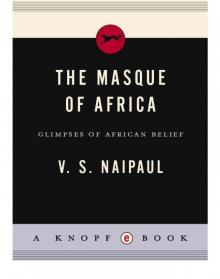 The Masque of Africa: Glimpses of African Belief
The Masque of Africa: Glimpses of African Belief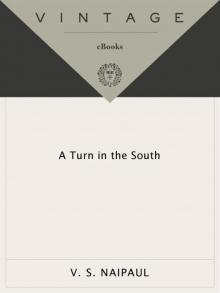 A Turn in the South
A Turn in the South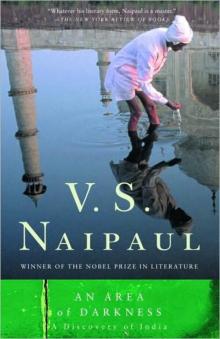 An Area of Darkness
An Area of Darkness Literary Occasions: Essays
Literary Occasions: Essays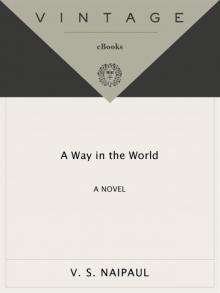 A Way in the World
A Way in the World Among the Believers: An Islamic Journey
Among the Believers: An Islamic Journey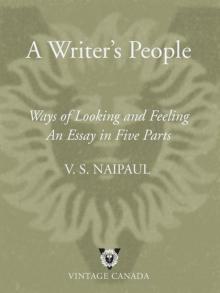 A Writer's People: Ways of Looking and Feeling
A Writer's People: Ways of Looking and Feeling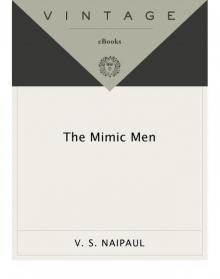 The Mimic Men: A Novel
The Mimic Men: A Novel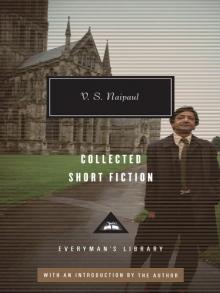 Collected Short Fiction
Collected Short Fiction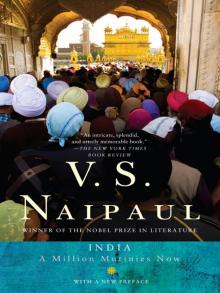 India: A Million Mutinies Now
India: A Million Mutinies Now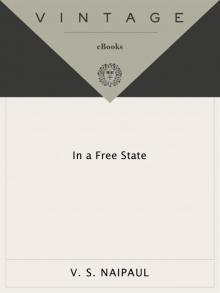 In a Free State
In a Free State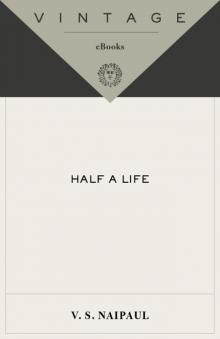 Half a Life
Half a Life Beyond Belief: Islamic Excursions Among the Converted Peoples
Beyond Belief: Islamic Excursions Among the Converted Peoples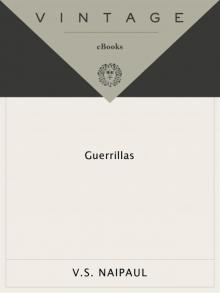 Guerrillas
Guerrillas A House for Mr. Biswas
A House for Mr. Biswas The Writer and the World: Essays
The Writer and the World: Essays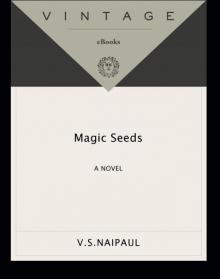 Magic Seeds
Magic Seeds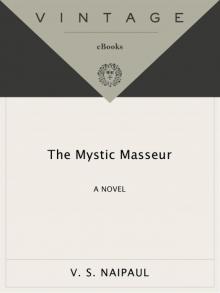 The Mystic Masseur
The Mystic Masseur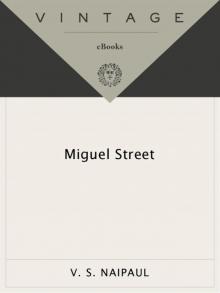 Miguel Street
Miguel Street The Return of Eva Perón, With the Killings in Trinidad
The Return of Eva Perón, With the Killings in Trinidad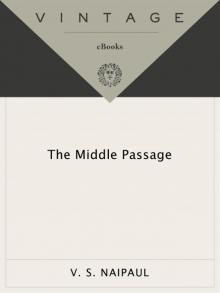 The Middle Passage
The Middle Passage A Bend in the River
A Bend in the River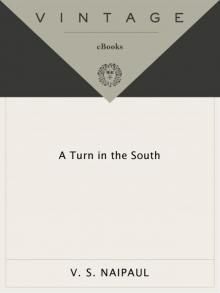 A Turn in the South (Vintage International)
A Turn in the South (Vintage International) Among the Believers
Among the Believers Literary Occasions
Literary Occasions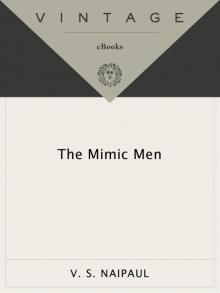 The Mimic Men
The Mimic Men The Writer and the World
The Writer and the World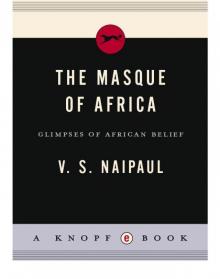 The Masque of Africa
The Masque of Africa